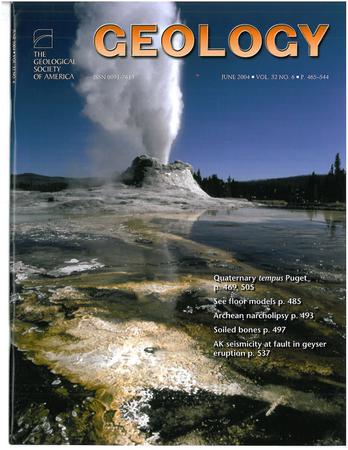Mantle metasomatism induced by water-fluxed melting of subducted continental crust at ultrahigh pressures
IF 4.6
1区 地球科学
Q1 GEOLOGY
引用次数: 0
Abstract
Mantle metasomatism under ultrahigh-pressure (UHP) conditions is widely recognized in orogenic peridotites and pyroxenites from UHP terranes. However, the processes by which the deeply subducted continental crust reacts with the mantle remain obscure. To investigate the metasomatic regime under UHP conditions, we conducted layered reaction experiments between gneiss and peridotite at 5 GPa and 800−1100 °C, with free water added in some of the experiments. At temperatures below the gneiss solidus, the major metasomatic agent is aqueous fluid, with the main reaction products being orthopyroxene + phlogopite + K-richterite. At temperatures above the gneiss solidus, hydrous melt becomes the major metasomatic agent, and the major reaction products vary from orthopyroxene + phlogopite to orthopyroxene + garnet with increasing degree of melting. The transformation from phlogopite to garnet occurred between 1000 °C and 1100 °C for runs without water added and between 800 °C and 900 °C for runs with water added. Pyroxenites in UHP terranes are mainly characterized by the metasomatic growth of orthopyroxene and garnet at 4−6 GPa and 750−1000 °C. Only experiments with water added reproduced the metasomatic assemblage at similar pressure-temperature conditions, indicating that mantle metasomatism in UHP terranes is probably mainly induced by water-fluxed melting of the continental crust under UHP conditions.由俯冲大陆地壳在超高压下的水溶熔融引起的地幔交代作用
超高压条件下的地幔交代作用在超高压地体造山橄榄岩和辉石岩中得到了广泛的认识。然而,深俯冲的大陆地壳与地幔发生反应的过程仍然不清楚。为了研究超高压条件下的交代机制,我们进行了片麻岩和橄榄岩在5 GPa和800 ~ 1100℃条件下的层状反应实验,在一些实验中加入了自由水。在片麻岩固相温度以下,主要的交代剂为水流体,主要反应产物为正辉石+绿云母+钾辉石。在片麻岩固相温度以上,含水熔体成为主要的交代剂,随着熔融程度的增加,主要反应产物由正辉石+云母到正辉石+石榴石。从绿云母到石榴石的转变发生在1000°C到1100°C之间,在没有加水的情况下,在800°C到900°C之间。UHP地体中辉石岩在4 ~ 6 GPa和750 ~ 1000℃条件下以正辉石和石榴石交代生长为主要特征。只有加水实验重现了类似压力-温度条件下的交代组合,表明特高压地体的地幔交代作用可能主要是由特高压条件下大陆地壳的水溶熔融引起的。
本文章由计算机程序翻译,如有差异,请以英文原文为准。
求助全文
约1分钟内获得全文
求助全文
来源期刊

Geology
地学-地质学
CiteScore
10.00
自引率
3.40%
发文量
228
审稿时长
6.2 months
期刊介绍:
Published since 1973, Geology features rapid publication of about 23 refereed short (four-page) papers each month. Articles cover all earth-science disciplines and include new investigations and provocative topics. Professional geologists and university-level students in the earth sciences use this widely read journal to keep up with scientific research trends. The online forum section facilitates author-reader dialog. Includes color and occasional large-format illustrations on oversized loose inserts.
 求助内容:
求助内容: 应助结果提醒方式:
应助结果提醒方式:


